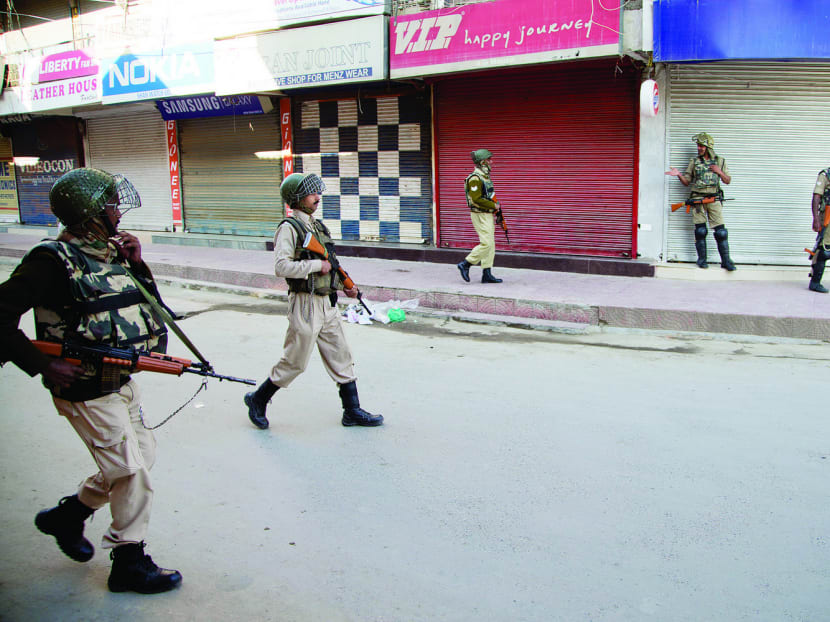Indian forces deployed in Kashmir to stop rally
SRINAGAR (INDIA) — Hundreds of government forces with automatic weapons patrolled the streets of Indian Kashmir’s main city yesterday to stop a rally by separatists to mark the anniversary of the assassinations of two Kashmiri leaders.

Indian paramilitary forces patrolling a closed market area in Srinagar yesterday. Photo: AP
SRINAGAR (INDIA) — Hundreds of government forces with automatic weapons patrolled the streets of Indian Kashmir’s main city yesterday to stop a rally by separatists to mark the anniversary of the assassinations of two Kashmiri leaders.
The two, Mirwaiz Mohammed Farooq and Abdul Gani Lone, had supported Kashmir’s right to vote on whether it should be independent or governed either by India or Pakistan, nuclear-armed nations that have fought two wars since 1947 over control of the region. The Himalayan territory is currently split by a heavily militarised line of control between India and Pakistan.
No one has been convicted of the killings, but they were believed to have been assassinated by militants for softening their stance on the issue.
Shops, schools and businesses closed and public transport stayed off the roads in Srinagar in response to a general strike call by separatists.
The authorities ordered residents in the old quarter of Srinagar to stay indoors and put Mr Mirwaiz Umar Farooq — the son of one of the assassinated leaders and who was scheduled to lead the rally — and some other separatist leaders under house arrest.
Mr Farooq was to have led a march to a cemetery where his father and hundreds of other Kashmiri separatists and civilians killed during the last 25 years are buried.
His father, Mirwaiz Mohammed Farooq, Kashmir’s chief cleric, was killed by assailants 25 years ago, and Abdul Gani Lone, another separatist leader, was gunned down in 2002 at a public rally observing Farooq’s death anniversary.
India and Pakistan have fought two wars over Kashmir. The region is divided between the neighbours, but claimed by both in its entirety.
Since 1989, rebel groups have been fighting against Indian rule. More than 68,000 people have been killed in the rebel uprising and a subsequent Indian military crackdown.
While the armed rebellion has largely been suppressed, the region remains heavily militarised amid frequent street protests, with checkpoints along main roads, while the deployment of hundreds of thousands of troops and harsh emergency laws create more friction with the population.
Since coming to power almost a year ago, Indian Prime Minister Narendra Modi has pledged to bring economic development to Kashmir. Mr Modi travelled there in December to drum up support for his Bharatiya Janata Party (BJP) during the November to December state elections.
The BJP and the Peoples Democratic Party (PDP) were able to form a coalition government in March — the first time the BJP has held a leadership position in the disputed region. AP





